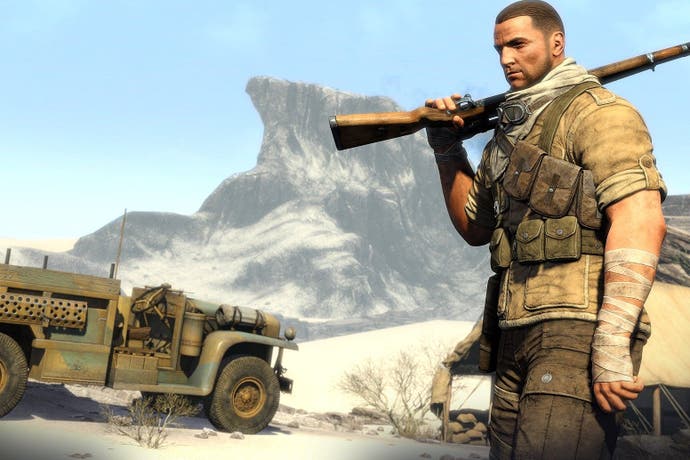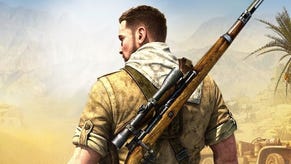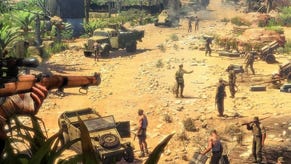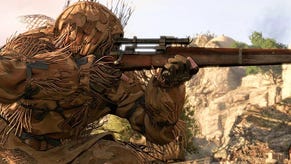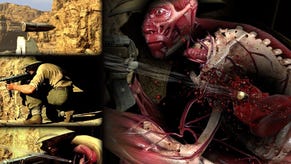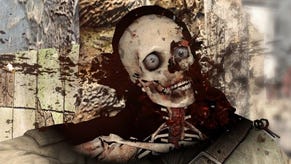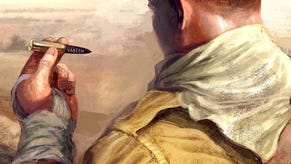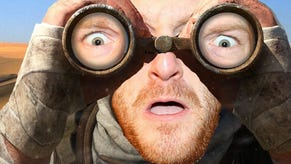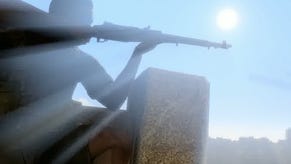Inside Sniper Elite 3's Rebellion, Britain's best guilty pleasure developer
How the Oxford studio became an indie all over again.
In the corner of Jason Kingsley's office sits a suit of armour. It's not quite shining; having been put to practical use by the co-founder of Sniper Elite 3 developer Rebellion when he first decided to take up jousting around five years ago, it's as weathered and beaten as the large, chilly warehouse on an Oxford industrial estate the developer calls home. But it's a perfectly anachronistic prop to find in this perfectly anachronistic studio - an indie with hundreds of employees, and a developer that's endured for well over 20 years without ever finding much in the way of critical success.
You'll know Rebellion from modern classics such as Rogue Warrior ("best described as disastrous"), Alien vs. Predator ("a deeply disappointing effort") or perhaps even NeverDead (which came complete with "a lingering sense of cheapness"). Yet the reviews tell half the story - Rogue Warrior was probably the greatest 2/10 of its generation, its credits sequence destined to live on through countless YouTube playthroughs long after memories of other, more celebrated games have flittered away, while games like NeverDead complement their flaws with a unique, endearing sense of character. "It's plucky, warm-hearted and genuinely idiosyncratic," wrote Chris Donlan in his review. "How often can you say that about a shooter these days?"

Rebellion isn't exactly blind to its reputation. "To a certain extent, our games are loved more by the audience that plays them than they're loved by the professional reviewer," says Kingsley. "We seem to, if you look at some of the aggregation sites, do better with user reviews than we do with professional reviews. I think if we get fairly criticised, and constructively criticised by professional reviewers, then, whilst it's hard to sometimes take criticism for something you've worked on for a couple of years, that's fine. And I'd defend everybody's right to say whatever the hell they like about my games."
People are starting to say nice things about Rebellion's games, though, and they're certainly not short of fans. Sniper Elite 3, a quickly turned around sequel in a series that's Rebellion's own, launched with some success last week, taking point at the head of the UK charts. "It's a rough diamond," Dan Whitehead said last week, "but it's a definite improvement over its predecessor."
For a game made by a team of 100 in a short 18 months, it's quite an achievement. "I think the nature of the franchise now, it's on its third iteration and I hope we've corrected some of those areas where we got dinged a bit in the past," says Kingsley. "The problem is we haven't had a very big team and we haven't had long to make it, so the danger is there'll still be some rough patches.
"But you compare that to some of Ubisoft's wonderful titles, where they have three years and 600 people. Are we going to be five per cent as good as the next massive game from Ubisoft? Yeah, we are. Are we going to be as big and as epic? I don't know, it's not something we're trying to do."
Rebellion, with 22 years of making games behind it and with no signs of that stopping any time soon, has perhaps a slightly different measure of success to the likes of Ubisoft, too. "Quite frankly, we're one of the last big games developers left in the UK," says Kingsley. "There are some others, but we're fully independent. We rest on the success, in terms of sales, of our games. I think in general the only real thing that matters is that we're still here, we're still a viable company which is quite an achievement."
Jason Kingsley and his brother Chris always had a penchant for gaming: growing up, the pair would play Dungeons & Dragons together, creating new spins on old formulas to confound their family. "I liked messing around with rule-systems and making variants on the games we played," says Kingsley. "I was never really content just to play a game. I always wanted to be involved in making it somehow."
While studying for a degree in Zoology at Oxford University, Kingsley was offered a job writing adventure books for Ladybird, something he undertook in his spare time. Soon after graduating, he landed a summer job at Oxford Digital Entertainment, before deciding to go freelance shortly afterwards.
"It was the early days where you could pitch a game with a mocked-up screenshot and two pages of daisy-wheel printed fan paper neatly torn," he reminisces. "If you were really good you'd have the paper with the fine perforations when you tore it, if you weren't you'd have the really crappy quality paper."
Kingsley made offbeat 8-bit games such as Mirror Blade and Better Dead Than Alien - "When I look back at them now they were truly independent, slightly bonkers games, in the days before it was trendy to have bonkers games," he says - before setting up Rebellion with his brother. There would be a couple of small projects undertaken with Atari, but it was 1994's Jaguar outing for Alien vs. Predator, built by a small team of between eight and ten people, that would help make the studio's name.
"We tried to pioneer all sorts of stuff, and I built panels to then photograph," says Kingsley. "And this was before digital cameras - we built them out of plasticine, straw and then photograph them with film. We'd take them down to Boots to get developed, then we'd take those prints and scan those with a primitive colour scanner. It was one of the first ever games to use 16-bit realistic graphics. It was the first game that I'm aware of that used photo-realistic elements in its make-up. You look back with rose-tinted glasses and go bloody hell, that took us a long time - now we'd probably churn that out in three weeks."
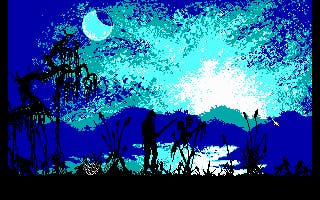
Alien vs. Predator has perhaps been the one constant across Rebellion's lifespan - five years after the Jaguar game it would revive the series on PC, and a further eleven years later it would return once again on behalf of a Sega still biding its time as it waited for Gearbox to deliver Aliens: Colonial Marines. Rebellion's 2010 take on Alien vs. Predator wasn't a critical success, though it was at the very least competent - much more than can be said of Gearbox's own botched take on the licence which eventually released early in 2013.
"Revisiting things is interesting - you find it's a bit like Groundhog Day," says Kingsley, who's too polite to be drawn on the record on the Colonial Marines saga. "We've been here before, we're having the same conversations again, now we've got much faster computers but we've still got compromises. There's no point as a game developer where we'll ever have the lead coder saying have as much memory as you like. There are always restrictions, even with next-gen, even with the fastest PC money can buy. It kind of keeps you on the straight and narrow."
The other constant throughout Rebellion's career is a canny business acumen. Much of its work through the last decade has been for hire - Rogue Warrior came about when Bethesda was dissatisfied with Zombie Studios' own work on the curious licence, with Rebellion parachuted in at the 11th hour, while NeverDead was a strange Konami project headed up by Metal Gear Acid director Shinta Nojiri - and while it was completing contracts the business expanded, with British comic book 2000AD being bought up and brought in-house, and then into book publishing with the imprints Solaris, Abaddon and Ravenstone.
In recent years, Rebellion has moved away from the work for hire model that, over time, proved draining. "It's like asking a builder for a ten-bedroom mansion and then saying I've only got enough for a two-up, two-down cottage. The answer is no - they've always been nerve-racking, because they've often been the projects you need to keep the company going."
"Chris and I anticipated the change in the business model, and it was pretty clear the standard work for hire model where you pitch a title and someone pays you - you might get royalties if you're lucky, but most of the time you don't - that was going away quite quickly. It was evaporating, and it was almost like watching a puddle in summer."
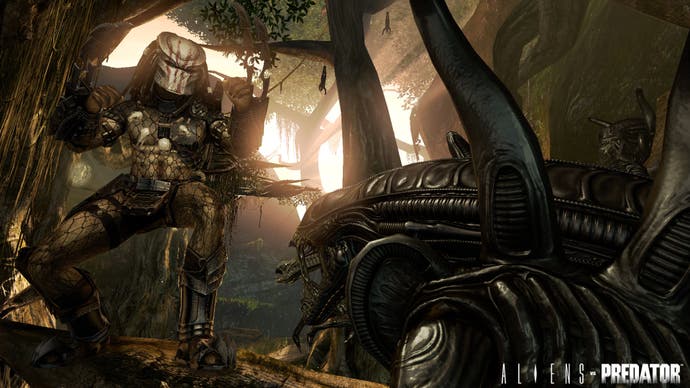
The diversification has helped, although games development still constitutes 80 per cent of Rebellion's business. Having its own internal technology - dubbed the Asura engine, and scaling from mobile to console as well as the studio's past decade of work - has also helped it keep nimble. "It's a little like my grandad's axe, which had three different axehead and five different handles," says Kingsley. "We call it our Asura engine, but I don't think there's anything left from the old days. That might have something to do with our success, though. We've been independent of middleware rises and falls. Renderware came and went, Unreal has a fantastic engine and Unity has come along and does different things. We've always had that slightly different look because we've got our own engine, our own technology."
Having its own IP helps, too, and the Sniper Elite series has been a roaring success for Rebellion. The original 2005 game, released on PC, PS2, Xbox and Wii, was an unremarkable but popular shooter, and since the series was revived in 2012 that popularity has blossomed. Sniper Elite V2 has sold half a million units on Steam alone, while series' stopgap Sniper Elite: Nazi Zombie Army - a project that started as an experiment for Rebellion's Runcorn office - brings considerable returns.
The success of Sniper Elite shouldn't come as too much of a surprise: it's a series that's shamelessly, honestly entertaining, where swipes at historical accuracy never get in the way of the meaty satisfaction of exploding a Nazi's nutsack with a well-placed metal slug. It quietly does what it does extremely well with a polite British air much like that which veils Rebellion and its co-founder Kingsley - a man who's very much in touch with his nationality, whether that's when called upon to play Henry Tudor in dramatic television reconstructions as he has been in recent months, or when he was honoured with the receipt of the order of chivalry.
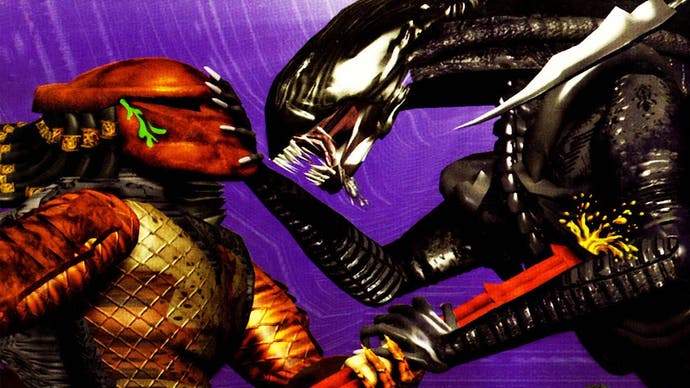
"My proudest moment is still being here, still being properly independent," says Kingsley of his own high points of the last 22 years, before a child-like sparkle lights up in his eyes. "And, I suppose, getting my OBE was pretty cool. It was really fun, sitting around a table with Members of Parliament, with people who do actually control how our system works, who are in control of the army who have secret networks of spies at their beck and call. Who are part of a historical tradition that goes back to Magna Carta. That was kind of nice."
Kingsley's a man of tradition, albeit often eccentric ones - the kind that see him spend his spare time retreating into that heavy armour atop his horse Warlord, jousting for the crowds that come to see the historical re-enactments he helps organise and losing himself in the stately homes he camps out in.
"Members of the public will be there from ten in the morning 'til four in the afternoon, and then they all go," he says. "You're left with fellow enthusiasts, camp-fires and quite a lot of alcohol - in my case, horses and things like that. You can't muck around exactly, but you've got this beautiful place to yourself, and you can wander through the grounds after hours." And so Jason Kingsley OBE clanks around by dusk, taking respite from the games industry as contemplates the countless noblemen who've walked these very grounds.
"It's just like any other hobby," he says of his weekend pursuits. "You start out as a newbie with all this enthusiasm, and you suddenly realise after you've been doing it for a while that you're now one of the grizzled veterans - and you're not quite sure when exactly that happened."
